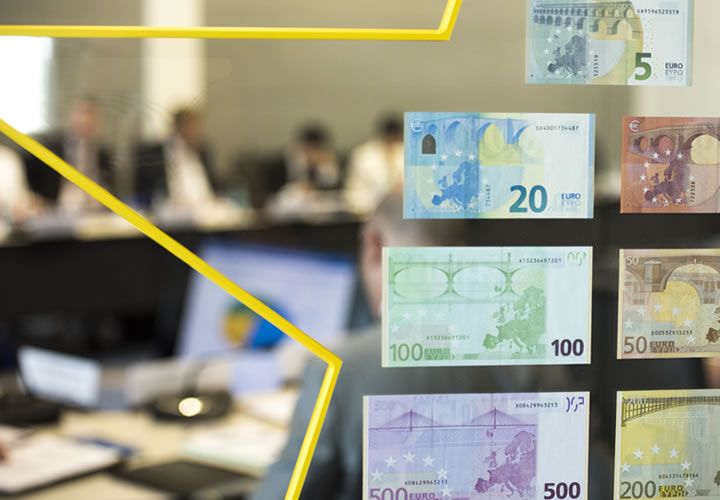The Euro to Pound Exchange Rate Forecast to Break Higher After French Presidential Election: Soc Gen

The EUR/GBP exchange rate is showing great potential for moving higher argues Société Générale’s foreign exchange strategist Kit Juckes.
Juckes says that the Euro has been kept unfairly cheap as a result of uncertainty due to the French Presidential election.
Once this is resolved, however, and more probably in the form of a Le Pen defeat, it will result in a removal of the risk premium keeping the Euro down.
Uncertainty over whether Le Pen will win or not has kept Eurozone yields down unnaturally low.
“Once that uncertainty is out of the way, the uptrend in European nominal and real bond yields will likely resume,” said Juckes.
Indeed, we have seen the Euro exchange rate complex climb higher into the weekend on new polling that suggests Le Pen is set for a decisive loss to independent candidate Emmanuel Macron.
'This Makes the Pound Vulnerable'
There is a theory that relative real yields are a more accurate driver of currency appreciation or depreciation than nominal yields.
Real yields are the return investors can hope for minus inflation; nominal ignores the erosion from inflation.
Regardless of this technical distinction German yields should rise after the relief of a Le Pen loss, leading to an outflow from this safe-haven.
When this filters through to the markets it should lift the Euro from its currently pressured level.
The transference of risk from the Pound which was risky after the referendum, to the now ‘too hot to handle’ Euro, is a theme mentioned by Bank of America Merrill Lynch’s (BofA) Claudio Piron, in a recent note seen by Pound Sterling Live.
“Our proxy for this rotation in political risk premium has been relative UK-German CDS spreads versus EUR/GBP. Since the end of last year, the cost of protection on German CDS has moved higher relative to that of the UK, a fact which has weighed on EUR/GBP and triggered the positional squeeze,” says Piron.
CDS stands for Credit Default Swap and is essentially an insurance asset which pays out if a country defaults. It therefore rises in value the more likely a country is to default, despite such an outcome being highly unlikely.
A state of affairs in which German Credit Default Swaps have risen relative to UK CDS’s is unlikely to remain for long given the UK’s not insubstantial economic risk from Brexit negotiations.
The rise in German CDS is more a one off event due to the risks of Le Pen winning rather than a longer-term risk as exists in the UK.
Therefore, the forces hampering the Euro are likely to unwind quite rapidly should Le Pen lose as looks likely.
BofA’s Piron also notes the “complacency” with which markets are treating the triggering of Article 50 in the UK.
“We think that the near-term bias remains asymmetric - that markets are too complacent in expecting a smooth transition towards negotiations and the final agreement (of Brexit),” he says.
This makes the Pound vulnerable.
“Our view on GBP vulnerability to Brexit news flow is supported by price action following news headlines this week regarding the possibility of a second Scottish Referendum and the EU's tough stance on equivalence for the City of London. We therefore stick to our call for one final dip in GBP/USD before a recovery into the end of the year as sterling is cheap relative to its medium-term drivers,” said Piron.
BofA’s strategist highlights what he sees as a greater than is currently perceived risk of negotiations between the UK and Eurozone falling at the first hurdle due to widely diverging agendas.
One of the EU’s key demands, for example, is for the UK to pay a 60 billion Euro “Exit Bill” which is unlikely to go down very well with UK negotiators.
As the focus attaches itself to the detail of negotiations any perceived delay will be interpreted as detrimental to Sterling.
After the Election
SocGen’s Juckes points out that the Euro will probably gain more buying momentum after the French presidential election because the focus can then shift to the European Central Bank (ECB) and the question of when it is likely to unwind its QE.
“The focus will turn rapidly back to if/when the ECB will further reduce the pace of its bond-buying programme,” said Juckes in a note seen by PSL.
The ECB are likely to begin tapering in the second half of 2017 according to most analysts.
The dismantling of the ECB QE programme will give the Euro a backdraught higher, and the process of pricing that in could begin even earlier after the French election is out of the way.
It is then that the EUR/GBP pair may rise in line with Juckes’ forecast.
He recommends buying the pair at 0.8640 with a target at 0.92.





